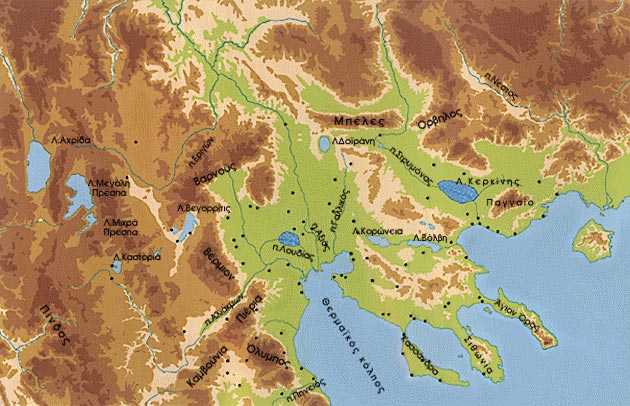
Macedonia
Ancient kingdom centred on the plain in the northeastern corner of the Greek peninsula, at the head of the Gulf of Thérmai. In the 4th century BC it achieved hegemony over Greece and conquered lands as far east as the Indus River, establishing a short-lived empire that introduced the Hellenistic Age of ancient Greek civilization.
The cultural links of prehistoric Macedonia were mainly with Greece and Anatolia. A people of unknown ethnic origins who called themselves Macedonians are known from about 700 BC, when they pushed eastward from their home on the Haliacmon (Aliákmon) River under the leadership of King Perdiccas I and his successors. By the 5th century BC the Macedonians had adopted the Greek language and had forged a unified kingdom. Athenian control of the coastal regions forced Macedonian rulers to concentrate on bringing the uplands and plains of Macedonia under their sway—a task finally achieved by their king Amyntas III (reigned c. 393-370/369).
Two of Amyntas' sons, Alexander II and Perdiccas III, reigned only briefly. Amyntas' third son, Philip II, assumed control in the name of Perdiccas' infant heir; but having restored order he made himself king (reigned 359-336) and raised Macedonia to a predominant position in Greece.
Philip's son Alexander III (reigned 336-323; see Alexander the Great) overthrew the Achaemenian (Persian) Empire and expanded Macedonia's dominion to the Nile and Indus rivers. On Alexander's death at Babylon his generals divided up the satrapies (provinces) of his empire and used them as bases in a struggle to acquire the whole. From 321 to 301 warfare was almost continual. Macedonia itself remained the heart of the empire, and its possession (along with the control of Greece) was keenly contested. Antipater (Alexander's regent in Europe) and his son Cassander managed to retain control of Macedonia and Greece until Cassander's death (297), which threw Macedonia into civil war. After a six-year rule (294-288) by Demetrius I Poliorcetes, Macedonia again fell into a state of internal confusion, intensified by Galatian marauders from the north. In 277 Antigonus II Gonatas, the capable son of Demetrius, repulsed the Galatians and was hailed as king by the Macedonian army. Under him the country achieved a stable monarchy—the Antigonid dynasty, which ruled Macedonia from 277 to 168.
Under Philip V (reigned 221-179) and his son Perseus (reigned 179-168), Macedonia clashed with Rome and lost. Under Roman control Macedonia at first (168-146) formed four independent republics without common bonds. In 146, however, it became a Roman province with the four sections as administrative units. Macedonia remained the bulwark of Greece, and the northern frontiers saw frequent campaigning against neighbouring tribes. Toward AD 400 it was divided into the provinces of Macedonia and Macedonia secunda, within the diocese of Moesia. (Encyclopaedia Britannica)